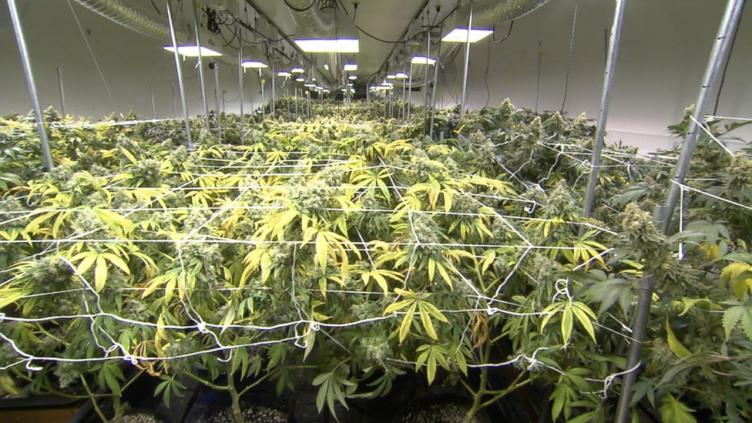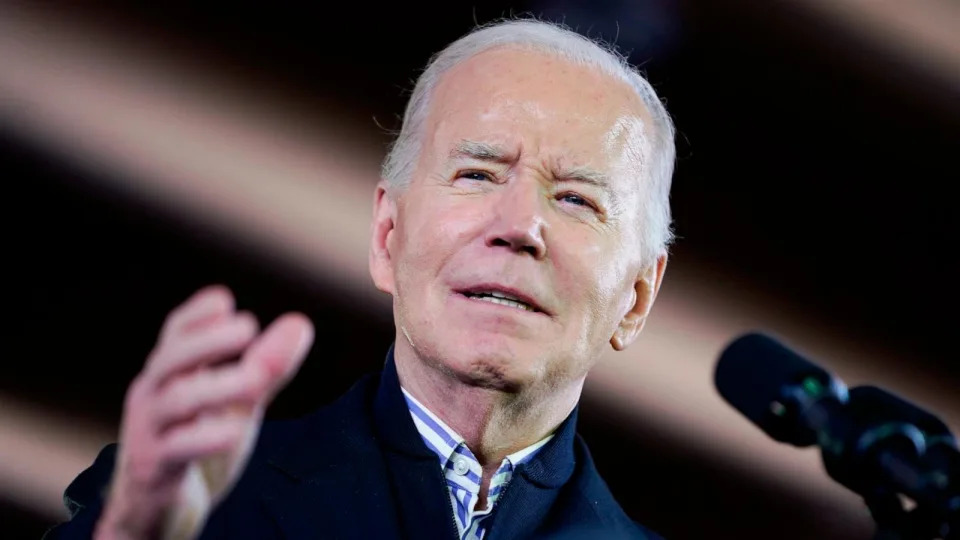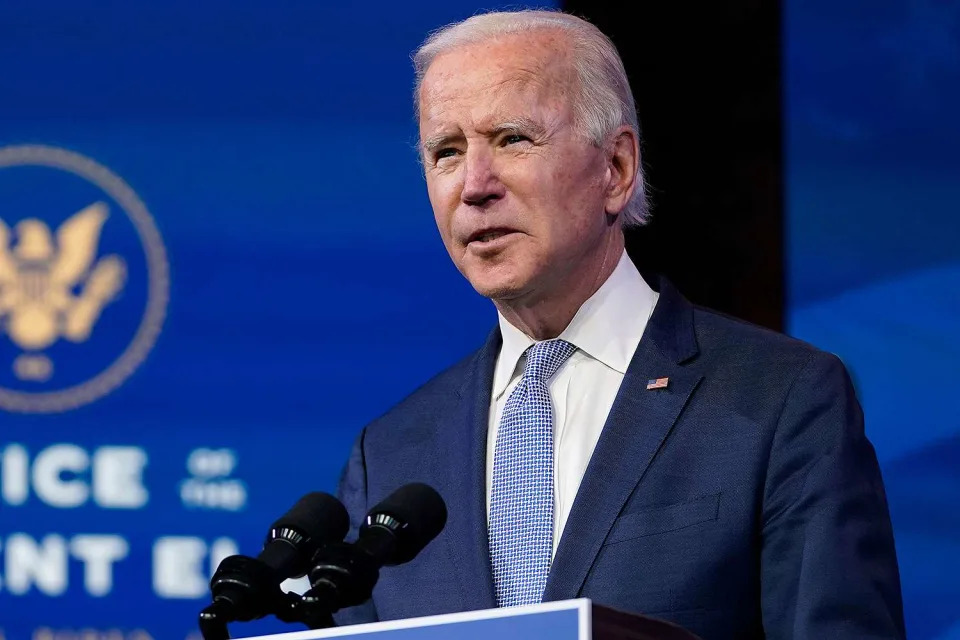Francesca Chambers, USA TODAY
Updated Fri, December 22, 2023
WASHINGTON — President Joe Biden announced Friday he's issuing a federal pardon to every American who has used marijuana in the past, including those who were never arrested or prosecuted.
The sweeping pardon applies to all U.S. citizens and lawful permanent residents in possession of marijuana for their personal use and those convicted of similar federal crimes. It also forgives pot users in the District of Columbia. It does not apply to individuals who have been jailed for selling the drug, which is illegal under federal law, or other marijuana offenses such as driving under the influence of an illegal substance.
The implication of Biden's pardon promises to have significant implications, as criminal records for marijuana use and possession have imposed barriers to employment, housing, and educational opportunities. However, the pardons do not apply to people who violated state law, and anyone who wants to receive proof of a pardon will have to apply through the Department of Justice.

A demonstrator waves a flag with marijuana leaves depicted on it during a protest calling for the legalization of marijuana, outside of the White House in Washington D.C.. President Joe Biden is pardoning thousands of Americans convicted of “simple possession” of marijuana under federal law, as his administration takes a dramatic step toward decriminalizing the drug and addressing charging practices that disproportionately impact people of color.
Biden issued a similar pardon last year and promised future reforms. This year's proclamation went further in that it forgave all instances of simple marijuana use or possession under federal law, including for individuals who have never been charged. It also expands Biden's previous directive to include minor marijuana offenses committed on federal property.
The White House says thousands of people with federal and D.C. convictions will be eligible for the pardons, which Biden announced three days before the Christmas holiday.
In a statement, Biden said Americans should not be sent to prison solely for using or possessing marijuana. He urged governors to forgive state offenses.
"Criminal records for marijuana use and possession have imposed needless barriers to employment, housing, and educational opportunities. Too many lives have been upended because of our failed approach to marijuana. It’s time that we right these wrongs," Biden said.
More: Many Americans arrested for marijuana won't find relief under Biden's pardon plan
Biden also commuted the sentences of 11 people he said are "serving disproportionately long sentences for non-violent drug offenses" and would have received lesser sentences if they were charged today.
The Congressional Black Caucus said the pardons are a "positive step forward in addressing long-standing racial disparities in crack and powder cocaine sentencing, which for generations, has disproportionately imprisoned Black Americans."
"It is our hope that clemency be granted to more Black Americans who have been criminalized by the decades-old policies of the War on Drugs era," the group said in a statement.
The American Civil Liberties Union’s Cynthia W. Roseberry, director of the organization's Justice Division, said in a statement that Biden's actions "send a strong message about the power of redemption" and will help to correct past injustices.
But, she said, Congress must change the law to prevent future Justice Department from revoking Biden's directive not to pursue higher sentences for crack offenses.
Marijuana users who want to take part in Biden's program will have to follow an application process set by the Department of Justice to receive a certificate confirming that they were pardoned under the president's broader order if they need to provide proof of clemency for employment or housing applications.
Biden's proclamation states that the attorney general "shall review all properly submitted applications for certificates of pardon and shall issue such certificates of pardon to eligible applicants in due course."
The Biden administration recommended that the DEA reschedule marijuana use to a lower offense earlier this year.
A record 70 percent of Americans said in an October survey conducted by Gallup that marijuana use should be legalized. It is favored by a majority of Republicans. And it is highly popular among the liberals, Democrats and young Americans who Biden hopes to inspire to vote for his reelection.
Recreational marijuana use is currently legal in 24 states and the District of Columbia. Medical marijuana is now widely allowed in the U.S. It is legal in 38 states.
Biden pardons certain marijuana offenses, grants clemency to 11 non-violent drug offenders
LAUREN PELLER
Fri, December 22, 2023

President Joe Biden announced Friday he was granting clemency to nearly a dozen people who have been serving long prison sentences for non-violent drug offenses.
The president also announced he was signing a proclamation to pardon certain marijuana offenses, building on action he took back in 2022 to pardon thousands of Americans who had been convicted of simple marijuana possession.
"America was founded on the principle of equal justice under law," Biden said in a statement. "Elected officials on both sides of the aisle, faith leaders, civil rights advocates, and law enforcement leaders agree that our criminal justice system can and should reflect this core value that makes our communities safer and stronger. That is why today I am announcing additional steps I am taking to make the promise of equal justice a reality."
MORE: Biden announces pardons for thousands convicted of federal marijuana possession
Of the 11 people who will have their sentences commuted, some were convicted to decades or even life in prison for crack cocaine-related offenses.
"All of them would have been eligible to receive significantly lower sentences if they were charged with the same offense today," Biden said in a statement.
According to a White House official, some individuals received sentences twice as long as they would likely receive now.

PHOTO: President Joe Biden speaks about his economic agenda at the Wisconsin Black Chamber of Commerce, Dec. 20, 2023, in Milwaukee. (Evan Vucci/AP)
Additionally, Biden will issue a proclamation to pardon additional marijuana offenses related to simple possession and use of the drug under federal and Washington, D.C., law.
"Criminal records for marijuana use and possession have imposed needless barriers to employment, housing, and educational opportunities," Biden said. "Too many lives have been upended because of our failed approach to marijuana. It's time that we right these wrongs."
MORE: Biden pardons 3 people, reduces sentences for 75 non-violent drug offenders
He also urged state officials to take similar action.
"Just as no one should be in a federal prison solely due to the use or possession of marijuana, no one should be in a local jail or state prison for that reason, either. That's why I continue to urge Governors to do the same with regard to state offenses and applaud those who have since taken action," Biden said.
ABC News' Alexandra Hutzler contributed to this report.
Joe Biden Commutes the Sentences of 11 Nonviolent Drug Offenders, Pardons Some Marijuana Offenses
Virginia Chamlee
Fri, December 22, 2023
"Criminal records for marijuana use and possession have imposed needless barriers to employment, housing, and educational opportunities," Biden said

Susan Walsh/AP/Shutterstock Joe Biden
President Joe Biden on Friday announced the pardons of 11 nonviolent convicted drug offenders, also issuing a proclamation that would pardon those convicted of certain marijuana offenses.
"As I have said before, criminal records for marijuana use and possession have imposed needless barriers to employment, housing, and educational opportunities," Biden, 81, said in the proclamation issued Friday.
Biden added that, through the proclamation, "individuals who may continue to experience the unnecessary collateral consequences of a conviction for simple possession of marijuana, attempted simple possession of marijuana, or use of marijuana," will be pardoned.
The proclamation builds on last year's historic pardon for federal offenders of simple marijuana possession and will mean that thousands of those who were convicted of use and simple possession of marijuana on federal lands and in the District of Columbia will now be eligible for pardons.
Currently, 25 states in the U.S. have fully legalized the use of marijuana, while 14 have legalized the its medical usage.
Related: President Biden Announces Federal Pardons for Simple Marijuana Possession Offenders
The 11 other people formally granted clemency on Friday had convictions ranging from conspiracy to distribute methamphetamine to conspiracy to distribute cocaine. The White House described the sentences for those nonviolent drug offenses as “disproportionately long."
Never miss a story — sign up for PEOPLE's free daily newsletter to stay up-to-date on the best of what PEOPLE has to offer.
The ability to set aside federal criminal convictions — even to try and prevent future prosecutions for a federal crime for which someone has not yet been charged — is one of the signature authorities of a president and it has few restrictions. (It does not, however, affect state crimes.)
During his 2019 presidential campaign, Biden had expressed that "nobody should be in jail for smoking marijuana," and the White House has said the executive clemencies are meant to rectify racial disparities in the justice system.
Read the original article on People.
No comments:
Post a Comment